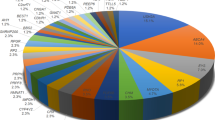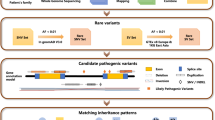Abstract
Purpose
This study aimed to analyze the genetic results of inherited retinal diseases (IRDs) and evaluate the diagnostic usefulness of whole genome sequencing (WGS) in the Korean National Project of Bio Big Data.
Methods
As part of the Korean National Project of Bio Big Data, WGS was performed on 32 individuals with IRDs with no identified pathogenic variants through whole or targeted exome sequencing.
Results
Individuals with retinitis pigmentosa (n = 23), cone dystrophy (n = 2), cone-rod dystrophy (n = 2), familial exudative vitreoretinopathy (n = 2), pigmented paravenous chorioretinal atrophy (n = 1), North Carolina macular dystrophy (n = 1), and bull’s-eye macular dystrophy (n = 1) were included. WGS revealed genetic mutations in the IQCB1, PRPF31, USH2A, and GUCY2D genes in five cases (15.6%). Two large structural variations and an intronic variant were newly detected in three cases. Two individuals had biallelic missense mutations that were not identified in previous exome sequencing.
Conclusion
With WGS, the causative variants in 15.6% of unsolved IRDs from the Korean National Project of Bio Big Data were identified. Further research with a larger cohort might unveil the diagnostic usefulness of WGS in IRDs and other diseases.



Similar content being viewed by others
References
Sahel J-A, Marazova K, Audo I (2014) Clinical characteristics and current therapies for inherited retinal degenerations. Cold Spring Harb Perspect Med 5:a017111
Georgiou M, Fujinami K, Michaelides M (2021) Inherited retinal diseases: therapeutics, clinical trials and end points-a review. Clin Experiment Ophthalmol 49:270–288
Vázquez-Domínguez I, Garanto A, Collin RWJ (2019) Molecular therapies for inherited retinal diseases-current standing, opportunities and challenges. Genes 10. https://doi.org/10.3390/genes10090654
Bessant DA, Ali RR, Bhattacharya SS (2001) Molecular genetics and prospects for therapy of the inherited retinal dystrophies. Curr Opin Genet Dev 11:307–316
Sohocki MM, Daiger SP, Bowne SJ et al (2001) Prevalence of mutations causing retinitis pigmentosa and other inherited retinopathies. Hum Mutat 17:42–51
Sengillo JD, Justus S, Tsai Y-T et al (2016) Gene and cell-based therapies for inherited retinal disorders: an update. Am J Med Genet C Semin Med Genet 172:349–366
Cwerman-Thibault H, Augustin S, Ellouze S et al (2014) Gene therapy for mitochondrial diseases: Leber hereditary optic neuropathy as the first candidate for a clinical trial. C R Biol 337:193–206
Galvin O, Chi G, Brady L et al (2020) The impact of inherited retinal diseases in the Republic of Ireland (ROI) and the United Kingdom (UK) from a cost-of-illness perspective. Clin Ophthalmol 14:707–719
Gong J, Cheung S, Fasso-Opie A et al (2021) The impact of inherited retinal diseases in the United States of America (US) and Canada from a cost-of-illness perspective. Clin Ophthalmol 15:2855–2866
Hartong DT, Berson EL, Dryja TP (2006) Retinitis pigmentosa. Lancet 368:1795–1809
Moore AT (1992) Cone and cone-rod dystrophies. J Med Genet 29:289–290
Tanaka K, Lee W, Zernant J et al (2018) The rapid-onset chorioretinopathy phenotype of ABCA4 disease. Ophthalmology 125:89–99
Bauwens M, Garanto A, Sangermano R et al (2019) ABCA4-associated disease as a model for missing heritability in autosomal recessive disorders: novel non-coding splice, cis-regulatory, structural, and recurrent hypomorphic variants. Genet Med 21:1761–1771
Ferrari S, Di Iorio E, Barbaro V et al (2011) Retinitis pigmentosa: genes and disease mechanisms. Curr Genomics 12:238–249
Retinal Information Network. https://web.sph.uth.edu/RetNet/. Accessed 10 Jun 2023
Britten-Jones AC, Gocuk SA, Goh KL et al (2022) The diagnostic yield of next generation sequencing in inherited retinal diseases: a systematic review and meta-analysis. Am J Ophthalmol 249:57–73
Ellingford JM, Barton S, Bhaskar S et al (2016) Whole genome sequencing increases molecular diagnostic yield compared with current diagnostic testing for inherited retinal disease. Ophthalmology 123:1143–1150
Kim KJ, Kim C, Bok J et al (2011) Spectrum of rhodopsin mutations in Korean patients with retinitis pigmentosa. Mol Vis 17:844–853
Lee SH, Yu HG, Seo JM et al (2010) Hereditary and clinical features of retinitis pigmentosa in Koreans. J Korean Med Sci 25:918–923
Yoon C-K, Kim NKD, Joung J-G et al (2015) The diagnostic application of targeted re-sequencing in Korean patients with retinitis pigmentosa. BMC Genomics 16:515
Oishi M, Oishi A, Gotoh N et al (2014) Comprehensive molecular diagnosis of a large cohort of Japanese retinitis pigmentosa and Usher syndrome patients by next-generation sequencing. Invest Ophthalmol Vis Sci 55:7369–7375
Xu Y, Guan L, Shen T et al (2014) Mutations of 60 known causative genes in 157 families with retinitis pigmentosa based on exome sequencing. Hum Genet 133:1255–1271
Tiwari A, Bahr A, Bähr L et al (2016) Next generation sequencing based identification of disease-associated mutations in Swiss patients with retinal dystrophies. Sci Rep 6:28755
Haer-Wigman L, van Zelst-Stams WA, Pfundt R et al (2017) Diagnostic exome sequencing in 266 Dutch patients with visual impairment. Eur J Hum Genet 25:591–599
Ma DJ, Lee H-S, Kim K et al (2021) Whole-exome sequencing in 168 Korean patients with inherited retinal degeneration. BMC Med Genomics 14:74
Vasimuddin M, Misra S, Li H, Aluru S (2019) Efficient architecture-aware acceleration of BWA-MEM for multicore systems. In: 2019 IEEE international parallel and distributed processing symposium (IPDPS), pp 314–324
Richards S, Aziz N, Bale S et al (2015) Standards and guidelines for the interpretation of sequence variants: a joint consensus recommendation of the American College of Medical Genetics and Genomics and the Association for Molecular Pathology. Genet Med 17:405–423
Kaur A, Dhir SK, Goyal G et al (2016) Senior Loken syndrome. Journal of Clinical and Diagnostic Research 10:SD03–SD04
Dockery A, Whelan L, Humphries P, Farrar GJ (2021) Next-generation sequencing applications for inherited retinal diseases. Int J Mol Sci 22. https://doi.org/10.3390/ijms22115684
Nash BM, Ma A, Ho G et al (2022) Whole genome sequencing, focused assays and functional studies increasing understanding in cryptic inherited retinal dystrophies. Int J Mol Sci 23. https://doi.org/10.3390/ijms23073905
Park ST, Kim J (2016) Trends in next-generation sequencing and a new era for whole genome sequencing. Int Neurourol J 20:S76–S83
Frio TR, Wade NM, Ransijn A et al (2008) Premature termination codons in PRPF31 cause retinitis pigmentosa via haploinsufficiency due to nonsense-mediated mRNA decay. J Clin Invest 118:1519–1531
Su B-N, Shen R-J, Liu Z-L et al (2022) Global spectrum of USH2A mutation in inherited retinal dystrophies: prompt message for development of base editing therapy. Front Aging Neurosci 14:948279
Li W, Jiang X-S, Han D-M et al (2022) Genetic characteristics and variation spectrum of USH2A-related retinitis pigmentosa and Usher syndrome. Front Genet 13:900548
Inaba A, Maeda A, Yoshida A et al (2020) Truncating variants contribute to hearing loss and severe retinopathy in USH2A-associated retinitis pigmentosa in Japanese patients. Int J Mol Sci 21. https://doi.org/10.3390/ijms21217817
Meng X, Liu X, Li Y et al (2021) Correlation between genotype and phenotype in 69 Chinese patients with USH2A mutations: a comparative study of the patients with Usher syndrome and nonsyndromic retinitis pigmentosa. Acta Ophthalmol 99:e447–e460
Turnbull C, Scott RH, Thomas E et al (2018) The 100 000 Genomes Project: bringing whole genome sequencing to the NHS. BMJ 361:k1687
Funding
This study was supported by the National Research Foundation of Korea (NRF) grant funded by the Korean government (the Ministry of Science and ICT) (No. 2022R1A2C4002114). This study was also supported by the Seoul National University Bundang Hospital (SNUBH) Research Fund (No. 14-2019-016). The sponsor or the funding organization had no role in the design or conduct of this research.
Author information
Authors and Affiliations
Corresponding author
Ethics declarations
Ethical approval
All procedures performed in studies involving human participants were in accordance with the ethical standards of the SNUBH (IRB B-2007-622-402) and with the 1964 Helsinki declaration and its later amendments or comparable ethical standards.
Informed consent
Informed consent was obtained from all individual participants included in the study.
Conflict of interest
The authors declare no competing interests.
Additional information
Publisher’s Note
Springer Nature remains neutral with regard to jurisdictional claims in published maps and institutional affiliations.
Rights and permissions
Springer Nature or its licensor (e.g. a society or other partner) holds exclusive rights to this article under a publishing agreement with the author(s) or other rightsholder(s); author self-archiving of the accepted manuscript version of this article is solely governed by the terms of such publishing agreement and applicable law.
About this article
Cite this article
Oh, R., Woo, S.J. & Joo, K. Whole genome sequencing for inherited retinal diseases in the Korean National Project of Bio Big Data. Graefes Arch Clin Exp Ophthalmol 262, 1351–1359 (2024). https://doi.org/10.1007/s00417-023-06309-5
Received:
Revised:
Accepted:
Published:
Issue Date:
DOI: https://doi.org/10.1007/s00417-023-06309-5




